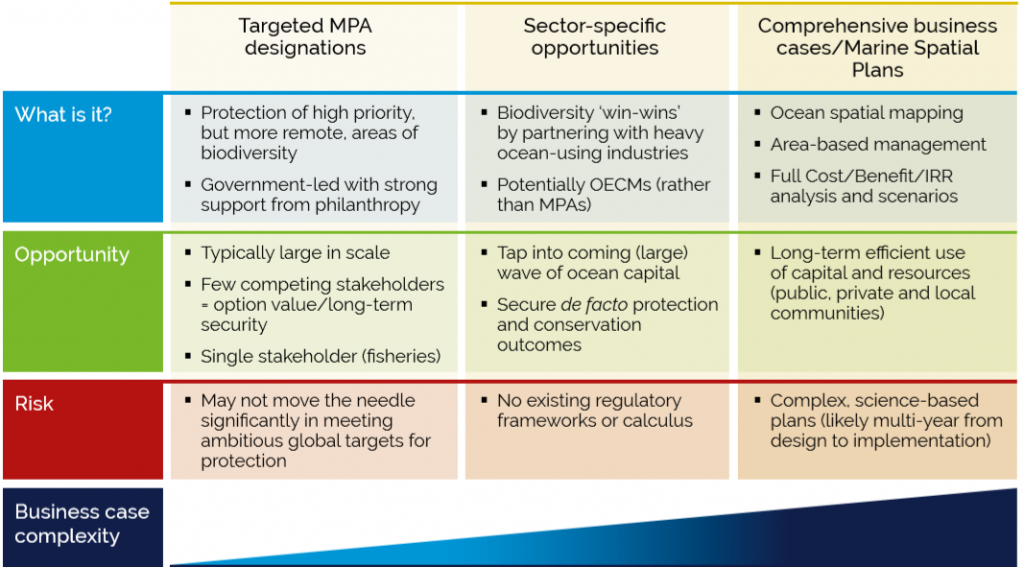Our Chief Sustainability Officer and Vice Chairman, Gloria Fluxa, talks about the importance of businesses leading the charge to protect natural resources in the 2019 Impact Report titled, “The Business Case for Marine Protection and Conservation.” This paper, linked at the bottom, proposes that for marine protection to scale, businesses must participate in the development of Marine Protected Areas (MPAs) and Other Effective Area-Based Conservation Measures (OECMs).
A Marine Protected Area is a clearly defined geographical space dedicated to achieving the long-term conservation of nature. MPAs are an important service for sustaining, and in some cases improving, the health of the oceans long-term. While they currently only represent a small percentage of the ocean (anywhere from 3-8%, though there is a global goal to reach 30% protection by 2030), the amount of potential value these areas present towards businesses and the surrounding area are very high. A gap still remains for the scaling of coastal marine protection and up to now, the high majority of MPAs are funded by progressive governments.
Establishing MPAs for private businesses are not quite as simple as declaring an area protected, there are associated challenges. One challenge is that MPAs operate primarily at a local level and rely on a single revenue stream, so private businesses have the issue of dealing with a wide range of sectors that have competing interests.
Additionally, the financial benefits from protecting those areas are hard to calculate because of the indirect revenue stream. An example outlined in this paper refers to the Caribbean spiny lobster, the commercial value it presents (approximately $1 billion) and the value that is not seen by ensuring its sustainability. By protecting the species (which Iberostar does for example in the Dominican Republic by observing the local lobster closure during the months of March through June) it allows the population to thrive and increases ecological productivity.
With all that said, there are paths forward for businesses to play an instrumental role in establishing MPAs. Financially, MPAs represent an underexploited asset, an asset that can be acquired at a low cost today and held onto for value later to ensure financial returns. Additionally, the amount of investment that goes into the fisheries industry is expected to nearly double over the coming decade and investing in MPAs helps protect those revenue streams for businesses.
The figure below focuses on the business case that is made for the conservation and protection of the oceans, it highlights the risk and opportunity associated with different actions as well as the complexity for businesses. Designating MPAs present high opportunity with little risk.

Last, but certainly not least, the case for businesses is the opportunity to lead. By establishing Marine Protected Areas and developing environmental plans, one is saying that protecting the environment is a way to ensure both the future of the planet and the business itself.
Iberostar understands the need to protect the ecosystems surrounding our properties and contribute to sustainability in the oceans. As outlined in two of our long-term goals, Iberostar will have 100% responsible seafood by 2025 and all ecosystems that surround Iberostar properties are improving in ecological health alongside profitable tourism by 2030. The latter is representative of this paper. Businesses can protect the environment and create economic value.






